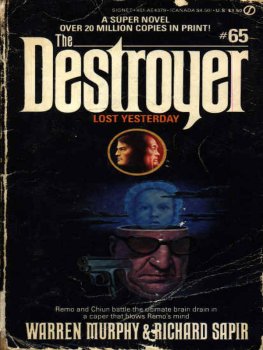Warren Murphy - High Priestess
Here you can read online Warren Murphy - High Priestess full text of the book (entire story) in english for free. Download pdf and epub, get meaning, cover and reviews about this ebook. genre: Science fiction. Description of the work, (preface) as well as reviews are available. Best literature library LitArk.com created for fans of good reading and offers a wide selection of genres:
Romance novel
Science fiction
Adventure
Detective
Science
History
Home and family
Prose
Art
Politics
Computer
Non-fiction
Religion
Business
Children
Humor
Choose a favorite category and find really read worthwhile books. Enjoy immersion in the world of imagination, feel the emotions of the characters or learn something new for yourself, make an fascinating discovery.

- Book:High Priestess
- Author:
- Genre:
- Rating:4 / 5
- Favourites:Add to favourites
- Your mark:
- 80
- 1
- 2
- 3
- 4
- 5
High Priestess: summary, description and annotation
We offer to read an annotation, description, summary or preface (depends on what the author of the book "High Priestess" wrote himself). If you haven't found the necessary information about the book — write in the comments, we will try to find it.
High Priestess — read online for free the complete book (whole text) full work
Below is the text of the book, divided by pages. System saving the place of the last page read, allows you to conveniently read the book "High Priestess" online for free, without having to search again every time where you left off. Put a bookmark, and you can go to the page where you finished reading at any time.
Font size:
Interval:
Bookmark:
Destroyer 95: High Priestess
By Warren Murphy and Richard Sapir
PROLOGUE
The Bunji Lama lay dying.
It was the second month of the Tibetan Year of the Fire Dog. Within the stone walls of the meditation cell whose Tibetan name translated as "Prayerful Refuge from the Temptations of the Sensual World," Gedun Tsering, forty-sixth Bunji Lama and the third Living Buddha, lingered as his regents fretted and paced the lamasery corridors in their boots of chewed yak hide.
On the lamasery roof, the howling winds spun the prayer wheels to no avail. The skies would not accept their whirling entreaties. Yak butter lamps guttered before the altar of Buddha Maitreya, and other lamps flickered in the cramped unglazed windows of the simple houses of the village. The Bunji Lama was destined to die on this day. All Tibet knew this. There was a single communications line that stretched out of the Himalayan village called Bunji-Kiang through the trackless snows and impassable mountain passes, and the wind-whipped line crackled with Morse code carrying the grim tidings to the dead Dalai Lama's regents in Lhasa and the living Panchen Lama in Peiping.
No one knew that the Bunji Lama had been poisoned. No one, that is, except the regents who had engineered the wicked deed and their victim, Gedun Tsering, the forty-sixth Bunji Lama, three weeks short of his fifteenth birthday.
As he lay in the chill of the meditation chamber, his slight body growing cool even as his stomach burned like a coal, the Bunji Lama's dying thoughts were of home. Burang. The village in which he was born, where he had played with his brothers and sisters, the son of a simple yak herder. Until the council of regents had come and stripped the cloth from his left arm, showing the birthmark that had pitted the shoulder of every Bunji Lama since the first. They had dangled the jade rosary of the previous Bunji Lama before his curious child's eyes, and when he reached for it, they proclaimed to the gullible that he had recognized a relic of his previous life. No one could deny them, for they were priests.
They bore Gedun Tsering away on a palanquin of gilt emblazoned with thunderbolts of bronze. It was a great honor. His mother wept, of course, but his father had beamed with pride. They were not allowed to visit him throughout the years in which he learned the five lesser and higher subjects, absorbed the tantras, studied the sutras and prepared to assume the exalted office of Bunji Lama, living incarnation of Champa, Buddha of the future.
As the day he was to be enshrined approached, the council of regents revealed him to the terrible hidden truths: that the previous Dalai Lama had been a weakling unworthy of the Lion Throne on which he had sat and that the Panchen Lama was a tool of the wicked Chinese who gnawed at Tibet's sacred borders like greedy rodents.
One day, he was told, it would be his destiny to unseat the next Dalai Lama, who had yet to be discovered, and cast out the Panchen Lama, who was a puppet of the Chinese. Only then would Tibet prosper. Thus had spoken the oracles, the regents had said.
The Bunji Lama had accepted none of this. The abbots stank of worldly ambition. Even he, still yearning for the humble village he had left behind, could see that they were but slaves of the sensual world.
So when he had refused their entreaties to denounce the rival lamas, and set the stage for assuming primacy over them, the regents had scolded him, argued and even threatened. Their worst threat had been to return him to the squalor of Burang. And when they saw in the Bunji Lama's eyes that he wished to go home more than anything else, they grew very still and locked him in his meditation room.
Finally, realizing they could not control their creation, they had poisoned his food.
Somewhere, they knew, would be found a child who could be molded into the forty-seventh Bunji Lama. It would only postpone their evil ambitions, not cancel them.
Thinking of that nameless unsuspecting child, ordained to be born in the exact moment of his own death, the forty-sixth Bunji Lama raised his voice. "Attend me, followers of the virtuous way! For I have seen a vision."
The ironbound teak door creaked open, and they padded in, resplendent in their scarlet-and-gold robes. They surrounded him, already laid out in his funeral robes of gold brocade in a long box lined with salt so that the embalmed husk of the Bunji Lama could lie in state, preserved, until his successor was brought to this lamasery in the mountains.
"The inexorable Wheel of Time turns," prophesied the Bunji Lama, "and I must drop this unworthy body for another. These are troubled times, for the fourteenth Dalai Lama has not yet been discovered and the need for my divine guidance is great. And so a vision has been revealed to me, one that will allow the faithful to locate my next body with utmost dispatch."
The abbots pressed closer, eagerness on their long faces. They believed. All save Lungten Drub, the high regent whose sour countenance curdled like day-old buttered tea.
The Bunji Lama let the words tumble out of him. "The next body that I shall reside in will have hair that is the hue of flame and will not remember this life," he said, "nor any of the trappings of it. No trapping of this body will stir recollection in me."
The abbots gasped. "But how will we recognize you, or you us, Presence?" one asked.
"You will know this body because in my next incarnation I will possess a golden joss with no face."
The abbots looked to one another. None had ever heard of such a figurine.
"This defaced joss will wield a sword and will be found in a place distant from here. By these signs, and others, will you know me, and I you."
"We will not rest until we find you again, O Presence," the abbots vowed.
And closing his eyes, the Bunji Lama smiled thinly-which the abbots took for an expression of his forbearance in the face of pain. In his heart he was glad. For there had been no vision. The faceless golden joss was a figment of his imagination. No such joss was to be discovered in all the world or any other world. Of this the Bunji Lama was certain.
He died in the next instant, secure in the knowledge that no innocent child would fall into the ambitious clutches of Lungten Drub and his council of regents, and that his cycle of reincarnations was at last over. Nirvana was his.
The winds howled down from the mountains, tearing the flimsy prayer flags from their anchorage. Conch shells were blown. The white flags of mourning went up, and all Tibet was desolated.
And in that exact moment, an incalculable distance from the meditation cell whose name meant "Prayerful Refuge from the Temptations of the Sensual World," a red-haired infant was born.
On the next morning, the search for the next Bunji Lama began.
It would go on for a very long time.
Chapter 1
The Most Holy Lobsang Drom Rinpoche sat naked in the cave that was his home high in the Himalayas. The winds that had howled around the snowcapped peaks relentlessly for the sixty years since the Fire Dog Year blew snowdrifts deep into the cave. Yet the stone floor in a circle around Lobsang Drom was moist with melted snow. It was as if his scrawny body were a human coal, giving off rays of warmth that defeated the accumulating flakes.
He did not shiver under the lash of the elements even though he ate but once a day and then only five grains of parched barley washed down by melted snow.
Distantly there was thunder. Not high above, in the howling sky, but far below, in the purplish black valley. The thunder came again. It climbed toward the sky, its echoes rebounding off the granite peaks. Somewhere a snow leopard growled.
Lobsang Drom listened to the thunder, knowing that it was not thunder but Chinese artillery. Below, Tibet was in revolt against the harsh rule of the oppressors from Beijing. It was painful to the ears, but there was many a painful thing in the world. Such as failure.
Next pageFont size:
Interval:
Bookmark:
Similar books «High Priestess»
Look at similar books to High Priestess. We have selected literature similar in name and meaning in the hope of providing readers with more options to find new, interesting, not yet read works.
Discussion, reviews of the book High Priestess and just readers' own opinions. Leave your comments, write what you think about the work, its meaning or the main characters. Specify what exactly you liked and what you didn't like, and why you think so.



